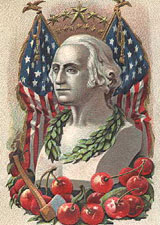
George Washington, born February 22, 1732 in Virginia, was a natural
leader, instrumental in creating a united nation out of a conglomeration
of struggling colonies and territories. The first president of the United
States of America is affectionately honored as "the father of his
country."
Shortly after his twenty-second birthday, Washington served in the army
of King George III of England and was put in command of a troop of
soldiers. The French were settling on British soil and turning the local
Indians against the British colonists. Later, in the war against the
French and Indians, Washington commanded large troops of soldiers and
showed courage that inspired all his soldiers.
At this time, King George III of England dominated the thirteen
colonies along the east coast and much of the surrounding territories.
Colonists began to want their freedom, and live with a set of rules based
on democracy, not under the rule of a faraway king. The Boston Tea Party(波士頓傾茶事件)of 1773, a colonial
rebellion against taxes, helped to spark the American Revolution.
Washington led and encouraged his inexperienced armies against the British
forces for eight years until the colonies won their independence.
Laws for the new country were written into the Constitution and the
Bill of Rights(權(quán)利與自由法案). The laws called for
a President, and here again George Washington was considered the natural
choice. He agreed to serve his country as the first President. George
Washington moved from Mount Vernon, his family home south of Alexandria,
Virginia, to New York City, then the capital of the United States. The
trip took a week by horse and carriage. All along the way, people waited
eagerly to glimpse the Revolutionary War general and their first
President.
Washington was a reluctant leader. As he inspired his soldiers through
two wars, he saw himself serving his country, not leading it. When he
accepted two terms as president, he saw himself serving God and his
country in peacetime(和平時期). He turned down a
third term as president, wishing only to retire to his beautiful family
home, Mount Vernon.
Americans celebrated Washington's birthday while he was still alive.
They were grateful for a strong leader who had proven that democracy was a
feasible way to govern the growing country. And, while he was alive,
legends grew up about him. The most famous one says that he was so strong,
he threw a silver dollar across the Potomac River. Some Americans argue
that this is a true story. Parts of the Potomac River, they say, were
extremely narrow a few hundred years ago! Another story which has never
been proven, but Americans pass down to their children as a lesson:
When George Washington was young, his father gave him a hatchet(短柄斧)He tried to cut down a cherry tree with
it. His father noticed the cuts on the tree, and asked his son how they
got there. "I cannot tell a lie," George said, "I did it with my hatchet."
Perhaps George Washington had no hatchet, and perhaps there were no cherry
trees where he grew up. However, George Washington today represents
honesty, and cherry pies have become a favorite food associated with his
birthday.
Various communities observe the holiday by staging pageants and
reenactments of important milestones in Washington's life. Also, the
holiday has taken on another side, much more commercial in nature. Many
shopping malls and stores run Presidents' Day sales to attract shoppers
who have the day off from work or
school. |